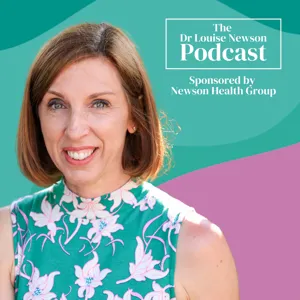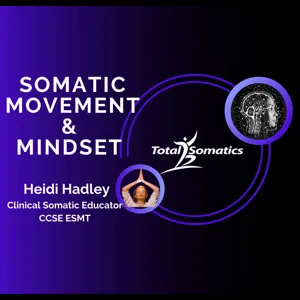Podcast Summary
Impact of Menopause on Eye Health: Regular eye exams are crucial during menopause due to hormonal changes causing dry eyes and potential vision issues.
The menopause can impact various aspects of our health, including our eyes. Dr. Louise Newson, a GP and menopause specialist, and her guest, optometrist Maria McColdrick, discussed this topic on Dr. Newson's podcast. Optometrists, like Maria, are not just about prescribing glasses. They provide holistic care for eye health, considering general health and well-being. Technology advancements have made eye examinations more precise and less intrusive. Dry eyes are a common menopause symptom due to hormonal changes affecting cells throughout the body, including those in the eyes. So, it's essential to prioritize regular eye exams, especially during menopause, to maintain good eye health.
Regular eye exams: More than just vision checks: Early detection of health conditions like diabetes, hypertension, and heart issues through regular eye exams using advanced technology like OCT, benefiting overall health, especially for those at increased risks during menopause.
Regular eye exams are crucial for early detection of various health conditions beyond just vision issues. The use of advanced technology like OCT allows optometrists to examine the layers of the retina and identify subtle changes, which can serve as early markers for diseases such as diabetes, hypertension, and heart conditions. These conditions can have significant implications for overall health, especially for individuals with increased risks during menopause. By prioritizing regular eye exams, individuals can receive early diagnoses and appropriate management, ultimately improving their overall health outcomes.
Dry eyes during menopause: A hidden symptom: Hormonal changes during menopause can cause dry eyes, impacting eye health and causing discomfort for nearly three quarters of women
Dry eyes, a common and often hidden symptom, particularly for women going through menopause, can significantly impact eye health. This condition, which can cause symptoms ranging from dryness to watery eyes, is linked to hormonal changes that affect the production and quality of the tear film. As estrogen levels decrease, the tear film may not provide adequate lubrication and protection, leading to discomfort, grittiness, and even the sensation of having something in the eye. This condition can be managed effectively, yet it remains a hidden symptom for many, affecting nearly three quarters of women in a survey of 6,000.
Dry Eye Symptoms Beyond Grittiness or Discomfort: Dry eye can cause various symptoms like increased blinking, foreign body sensation, burning or stinging, glare issues, light sensitivity, anxiety, depression, and can significantly impact quality of life. Hormone replacement therapy can help some women, and optometrists offer treatments like lubricating eye drops to manage it.
Extended screen time and certain life stages, such as menopause, can lead to various dry eye symptoms beyond just grittiness or discomfort in the eyes. These symptoms can include increased blinking, foreign body sensation, burning or stinging, glare issues, light sensitivity, and even anxiety and depression. The disruption to the tear film can make it difficult to see clearly, similar to a rippled lake obscuring a fish. Dry eye can significantly impact quality of life, and it's essential to address it before it becomes severe. Lubrication is crucial for all mucous membranes and tissues, and symptoms related to vaginal dryness, such as dry mouth and skin, may also indicate dry eyes. Hormone replacement therapy (HRT) can be effective for some women, particularly those experiencing menopause, as both estrogen and testosterone play a role in tear production. Optometrists assess dry eye through thorough eye exams and offer various treatments, including lubricating eye drops, to manage the condition.
Assessing Dry Eyes: Understanding Meibomian Glands: Meibomian glands dysfunction can lead to dry eyes. Assess through fluorescein dye during exams. Menopause symptoms may contribute. Treat with preservative-free drops, consistent management, and reminders for regular use.
Dry eyes can be caused by the dysfunction of the meibomian glands, which produce a protective layer in tears to prevent evaporation. This condition can be assessed through various methods, including the use of fluorescein dye during eye exams. Patients may not always mention menopause symptoms, which can also contribute to dry eyes, so it's important to share this information with healthcare professionals. Treatment for dry eyes involves the use of preservative-free or low preservative drops, and maintaining a consistent management plan, as it is a chronic condition. It's important to find ways to incorporate eye drop use into daily routines to ensure effective treatment. For example, keeping drops beside a desk or near a toothbrush can help remind individuals to use them regularly.
Managing Dry Eye is a Long-Term Commitment: Patiently commit to treatment for 1-6 weeks, using eye drops regularly for dry eye relief. Don't overlook this condition, as it can limit activities and impact mental health.
Managing dry eye is a long-term commitment, not a short-term fix. Compliance with treatment, such as using eye drops regularly, is crucial for improvement and symptom relief. It may take between a month and six weeks to notice improvement, and it's essential to be patient and persistent. Neglecting dry eye can significantly impact your quality of life, limiting activities and potentially leading to mental health issues. Don't wait until symptoms become severe before seeking help. Dry eye can be easily overlooked, but it can have a significant impact on your daily life, making it important to address it promptly. It's essential to remember that optometrists are not just for new prescriptions; they can also help diagnose and manage conditions like dry eye.
Identifying hormonal causes of eye symptoms during menopause: Healthcare professionals need training in menopause and perimenopause to identify hormonal causes of eye symptoms, especially dry eyes, and provide ongoing communication and collaboration for effective treatment.
Eye health during the menopause is more complex than just needing new glasses or dealing with common vision issues. Optometrists and ophthalmologists play a crucial role in identifying potential hormonal causes of eye symptoms, especially dry eyes, which can worsen before menstruation. This requires healthcare professionals to have training in menopause and perimenopause. Hormonal imbalances can also impact other health conditions like diabetes and kidney disease, highlighting the importance of a team approach to healthcare. While hormone optimization is essential, symptoms and treatments can change over time, making ongoing communication and collaboration between healthcare professionals necessary.
Regular Eye Check-ups and Optometrist Visits: Maintain eye health, monitor conditions, and adjust treatment plans by visiting an optometrist regularly. Keep an eye out for age-related vision changes and prioritize visual solutions to enhance overall well-being.
Maintaining good eye health and regularly checking in with an optometrist is essential for managing various eye conditions and preserving quality of life. Optometrists can help adjust treatment plans as needed and monitor for conditions like glaucoma, cataracts, and retinal changes. Regular testing, ideally every two years, is crucial for establishing a baseline and tracking progression over time. Additionally, from around age 40, presbyopia can make reading difficult, leading to eye strain and headaches. Embracing visual solutions and staying informed about your eye health can significantly improve your overall well-being.
Seeking professional help for dry eyes is crucial: Regular checkups, open communication, and personalized treatment plans are essential for effective relief of dry eyes. Don't wait for symptoms to worsen, discuss underlying conditions with your optometrist, and consider hormonal factors.
When it comes to eye health, particularly for those experiencing dry eyes, it's crucial not to rely on off-the-shelf solutions. Instead, seeing a specialist and getting customized lenses and treatment is essential for effective relief. Here are three key takeaways for those dealing with dry eyes: 1. Regular eye exams every two years are important to catch potential issues early and discuss your symptoms with your optometrist. 2. Don't wait until symptoms become severe; seek professional help as soon as you suspect you have dry eyes. 3. Be open with your optometrist about any underlying conditions, such as menopause, that may be contributing to your dry eyes. This information will help them create a personalized treatment plan for you. Additionally, hormonal changes can impact eye health, making it essential to consider the whole picture when addressing dry eyes. Regular checkups and open communication with your healthcare provider are essential for proper diagnosis and treatment. For more information, visit www.newsonhealth.co.uk, and download the free balance app on the App Store or Google Play.






